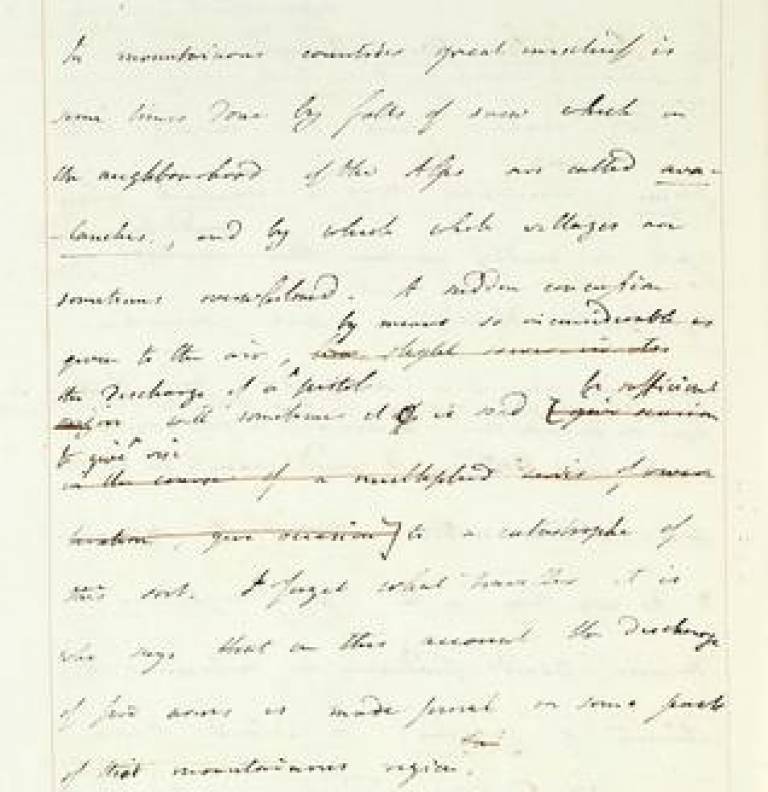Many hands make light work of Bentham's legacy
8 September 2010
Press release Links
 transcribe-bentham.da.ulcc.ac.uk/td/Transcribe_Bentham" target="_self">Transcribe Bentham
transcribe-bentham.da.ulcc.ac.uk/td/Transcribe_Bentham" target="_self">Transcribe Bentham
The public has a chance to solve a major academic mystery by helping bring to light the work of philosopher Jeremy Bentham after centuries, thanks to a groundbreaking UCL project launched today.
'Transcribe Bentham' is an online tool designed to harness the effort of all Bentham fans - whether schoolchildren, historian enthusiasts, retired academics or armchair philosophers - to bring his work into the digital age and the world at large.
UCL's founding fathers were heavily influenced by Jeremy Bentham's principles of equal opportunity in education and the UCL library houses 60,000 of Bentham's documents, covering his views on everything from politics and history, to law.
However, the content of many of his writings have remained a mystery, given the time-consuming and costly process of transcription from the original handwritten papers, quality checking and print publication. Only about one-third of Bentham's folios have been transcribed, and an even smaller proportion exists in published form. Bentham scholars have been tantalised for decades by the intellectual importance of the content of hundreds of boxes.
The UCL Centre for Digital Humanities and the Bentham Project at UCL Laws aim to solve this mystery by drawing on the enthusiasm of Bentham fans worldwide to help transcribe the philosopher's oeuvre online using a specially designed 'wiki': a piece of software that enables multiple people to write and edit content in a unified online space.
The project is the first known example of large scale 'crowdsourcing' transcription being used to further academic research, and it is being funded by the Arts and Humanities Research Council.
Valerie Wallace, the project's coordinator, said: "There are 60,000 Bentham papers in UCL's library, many of which are untranscribed and unstudied, but which are potentially of immense intellectual importance. Transcribe Bentham is not only an academic endeavour; we are hoping through this project to promote Bentham's legacy to the public, engage A-level students with their curriculum on a new level, and involve the wider community in the preservation and documentation of the nation's history."
The Photographic Unit in UCL's Learning and Media Services has taken around 12,500 photographs of Bentham's notebooks. These will be digitised and posted online over the coming year for the public to transcribe using a simple interface. The first writings to be made available will be relatively easy to decipher, while the more difficult sections - written in the ageing Bentham's deteriorating script - will be saved for later, although a magnification function will be on hand to help unpick the trickier parts.
The volunteer transcribers will be able to select sections to work on by theme, including religion, law, and politics, as well as by periods in Bentham's life.
Guidelines and a YouTube tutorial are available on using the tool, and a forum will help those taking part share their ideas and discoveries. All contributors can add notes and suggestions to all the transcriptions, which will be assessed for accuracy and quality by specialists at the UCL Bentham Project.
The volunteers' efforts, like Bentham's writings, will be preserved for posterity: the transcriptions will ultimately form the basis of new, printed editions of Bentham's works and a fully searchable online database for use by scholars in generations to come.
-Ends-
Media Relations contact: Dave Weston
Image: Detail from one of Bentham's original manuscripts
UCL Context
The UCL Centre for Digital Humanities, based within UCL Information Studies, was launched by James Murdoch of News Corporation in 2010, to bring together people from a wide range of disciplines at UCL, to develop research and teaching in this multidisciplinary field.
Digital humanities research takes place at the intersection of digital technologies and humanities. It aims to produce applications and models that make possible new kinds of research, both in the humanities disciplines and in computer science and its allied technologies. It also studies the impact of these techniques on cultural heritage, memory institutions, libraries, archives and digital culture.
 Close
Close

